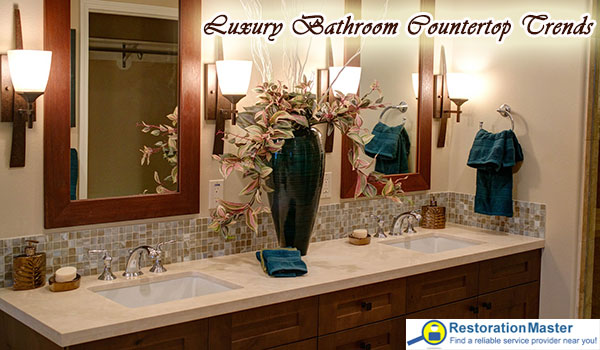Tips for Polishing Marble Countertops
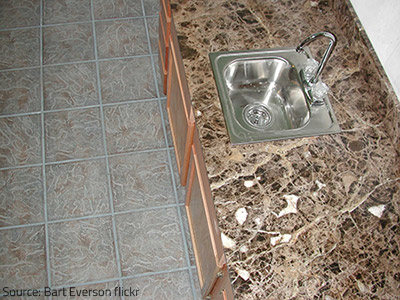
Marble has long been prized for its unique shine and beauty.
Marble has been a symbol of splendor and refined taste since ancient times. The softness and homogeneity of the stone make it easy to carve, but it is the unique property of white marble to allow light to penetrate into the stone, resulting in the characteristic “live” look of marble sculptures, which renders it the most preferred material among sculptures and architects around the world. Besides, the extremely varied and colorful patterns of marble make it a favorite decorative material which is widely used for different purposes.The grandeur this beautiful stone imparts to the surroundings is the reason why it is one of the most frequently chosen and highly valued materials for bathrooms and kitchens. However, the type of marble most commonly used in homes is the so-called cultured marble which is marble dust combined with cement or synthetic resins to make it cheaper, sturdier and easier to maintain. Solid marble, on the other hand, is very porousPorous describes a material that contains small openings or ... More, much more prone to damage and needs a lot of extra care.
However, with time passing by or as a result of abrasive materials or acidic substances mistakenly used to clean your beloved and expensive marble countertops, they can easily get stained or scratched and often begin to look dull due to the extensive wear and tear. Here are some practical tips for removing small imperfections from the surface and restoring the shine of the wonderful natural stone simply by polishing your marble countertops.
Clean Regularly
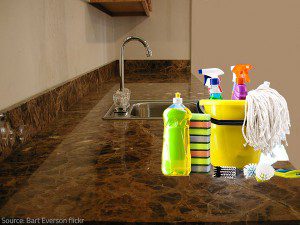
Marble is delicate, so you need to treat it gently – use only soft cloths and mild washing agents.
Proper marble countertop maintenanceMaintenance is the routine care, inspection, and repair of a... More will, of course, considerably prolong the beauty and the gleam of the material. All you need is a soft cloth (microfiber ones are considered to be the best for the purpose), warm water, and just a few drops of a mild cleaning agent. Marble is very delicate, so avoid any abrasive materials and remember that even washing powder and soap will leave residues on the surface. Rinse the area profusely and always wipe dry with a soft clean towel.
What you should be careful about when cleaning marble countertops:
- Never use bleach or any cleaning products that contain alkaline (even lemon) or some other acidic substances because the marble sealer will degrade;
- Remember that vinegar and other substances that contain natural acids will also dull the surface;
- Abrasive cleaning agents or hard brushes will etch the marble and even tiny scratches will diminish the beautiful shine of the material while deeper ones can damage it seriously;
- Use only cleaning materials that are specially designed for marble. They should be pH-neutral, so that they don’t harm the stone. You can safely use acetone for dark marble and hydrogen peroxide for light marble, but definitely not vice-versa;
- Always use plenty of warm water to make sure you have rinsed the countertop really well and make sure that no residueResidue is any leftover material, such as soot, dust, or che... More has remained;
- Do not just let wet marble air dry because water spots will remain all over the surface.
Remove Spills Instantly
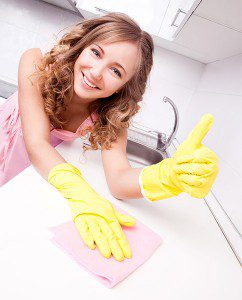
Marble countertops will last for many years and will preserve their beauty when properly taken care of.
Unless you have the habit of cleaning any spills on a countertop really quickly, the liquid will penetrate the porousPorous describes a material that contains small openings or ... More marble and will leave ugly stains that are difficult to remove. Oil, coffee, wine, fruit juices, and sauces must be immediately blotted up to prevent damage. Coarse wipes will scratch the countertop, so be careful – don’t scrub but wipe gently with circular motions.
Also, remember to use coasters under cups and glasses and never put hot dishes or sharp-edged items directly on the countertop. Avoid placing metal containers on marble surfaces to avoid rustRust is a reddish-brown oxide that forms on iron or steel du... More stains and use trays for bottles of cleaning agents, cosmetics, or anything that could damage the countertop if accidentally spilled.
If a persistent stain is left on the marble despite all the precautionary measures you have taken, you can use baking soda dissolved in water, alcohol, or hydrogen peroxide. Wet the stain, apply the poultice, cover the place with a plastic wrap, and wipe with a damp soft cloth after several hours (dryingDrying is the process of removing moisture from materials, s... More for 24 hours is recommended for best results). However, first try this approach on a very small area that is not clearly visible because the effect depends strongly on the exact type of marble in your home and the safety of the method is a highly controversial matter. Or you can use a professional specific poultice stain remover instead.
How To Polish Marble Countertops
The first step is to prepare the marble surface by cleaning it thoroughly. Remove any accumulated dirt, grime, or grease with an appropriate commercial stone cleaner and a spongeA sponge is a porous material used to absorb liquids or clea... More or a soft cloth, rinse lavishly, and make sure the marble is completely dry before polishing it. Also, be sure to remove any stains as described above.
If you are going to polish the marble countertops by yourself, you are advised to purchase a ready-made re-polishing and sealing kit (which comes with specific polishing compound, all the necessary materials and specific instructions) and appropriate tools. You will need a variable-speed grinding machine, appropriate for domestic use, or at least very fine-grained sandpaper for really light scratches.
You should be able to wet sand shallow scratches and surface stains off. If the results are satisfactory, rinse and dry the countertop. And don’t forget to finally buff it with an appropriate product.
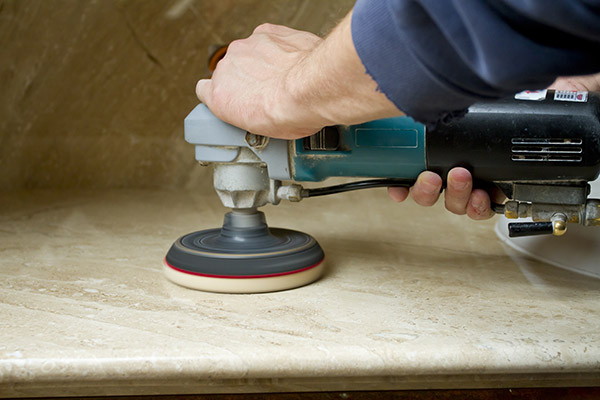
If you use the right equipment, the results will be astonishing.
Polishing marble countertops in a more efficient and professional manner, however, requires the use of specific equipment and appropriate techniques:
- Attach a 1 – 3″ Velcro backed dense felt wheel and a rigid backer to your low-speed polisher or grinder;
- Pour out the right amount of the polishing compound on the surface and work with the felt wheel at a low speed;
- Polish the marble with rotary motions and do not forget corners and edges;
- Remove the polishing compound with a vacuum and finally use a damp cloth to make sure nothing has remained on the surface.
Another traditional method to restore the gleam of marble countertops is to polish them with baking soda. Mix three tablespoons of soda with one quart of water and apply it on the surface, then let air dry for several hours. After washing it with warm water, wipe crushed chalk on the countertop, rinse again, and dry with a chamois cloth. The marble should be well polished but recently the prevailing opinion is that this method could actually ruin the stone, as already mentioned above.
Actually, even gentle rubbing with a simple chamois cloth dampened in warm water with some mild dishwashing product can return the shine of your marble when the countertops are not damaged.
Finish With Marble Sealer
Whatever method you find appropriate, don’t forget to seal the marble on the next day to better preserve the surface and to help prevent future damage. A sealer resists moisture and protects against staining and molding. Make sure your chosen marble sealer is adequate for the kind of marble in your home, that it is non-toxic and safe for food preparationPreparation is the steps taken to ready a property, equipmen... More.
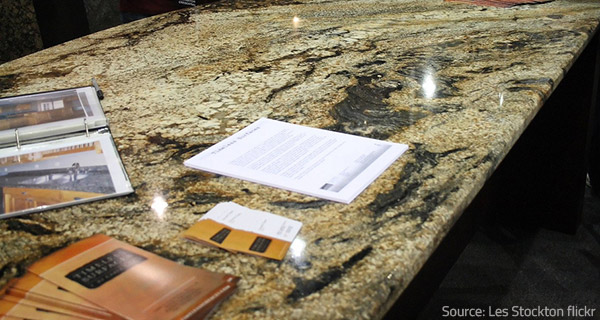
The perfectly polished natural stone is a real pleasure to look at.
Apply an impregnating stone sealer with a soft rag or a soft-bristled brush. When it has dried completely, your countertop will be ready to use and it will be a real pleasure to look at.
Ask For Help
In case the damage is more severe or if you are not sure what method to use and don’t want to risk harming your gorgeous marble, you’d better call the experts. It will probably not cost you more than purchasing the required quality materials and particular tools, not to mention the time you will lose in the process and the highly uncertain outcome. Professional marble cleaners have specific equipment and the required know-how. They will know what type of marble your countertop is and how to deal with it properly. Their skillful approach and adequate materials will restore any marble piece to its original splendor. Specialists will put the finishing touches to their work by applying a quality sealing coat. By the look of your newly-polished countertops, you will be more than happy that you have decided to invest in hiring professionals.
Marble has stood the test of time – it has adorned homes and palaces, libraries and cathedrals, for many centuries. With sufficient care, you will be able to properly maintain its beauty and durability in your home, too.











